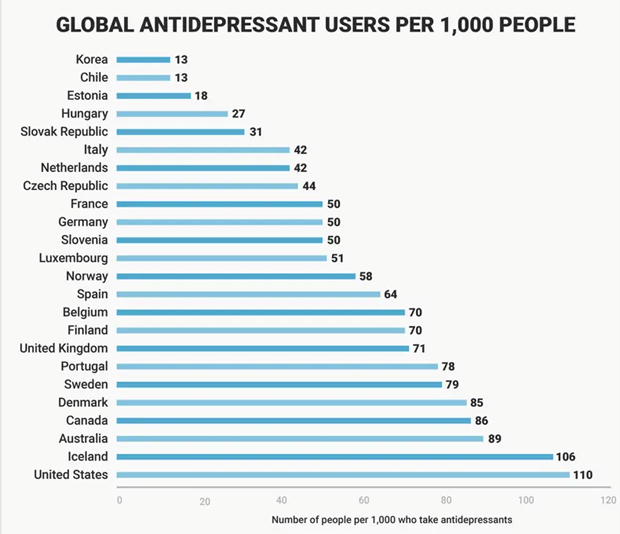Mission Statement
The Not Broken Project challenges the dominant narrative that emotional and psychological distress is evidence of a ‘broken brain’, requiring lifelong pharmaceutical treatment.
About seven million Australians (over a quarter of the population) are taking mind altering drugs for emotional distress and behavioural challenges (most commonly, anxiety, depression, ADHD) as well as for what is commonly referred to as serious mental illness (1-3% of the population). It’s time to look more critically at what is actually going on and chart a new course.
Our commitment
We are committed to creating a more compassionate, informed, and holistic approach to supporting mental health through:
-
1. Raising Awareness
We educate the public, health professionals, and policymakers on the limitations of the 'chemical imbalance' theory and the over medicalisation of mental distress more generally.
-
2. Improving care and treatment
We provide information to help clinicians, and the general public better understand the scientific realities of psychotropic medications—including side effects and withdrawal—encouraging more informed, patient-centred care. When doctors prescribe drugs to relieve mental distress or behavioural challenges, they will do so understanding that in most cases they are suppressing symptoms, not correcting an underlying chemical imbalance.
-
3. Advocating for Policy Reform
We work to shift mental health policy toward addressing the social, developmental, and environmental roots of mental distress, reducing reliance on medication-first approaches.
Ultimately people seeking help for mental distress or behavioural challenges will no longer be left feeling that have a broken brain or lifelong deficit which can only be helped by biomedical intervention.
We’re not alone in our concerns
- The World Health Organisation (WHO) states it’s ‘critical that the mental health system and services widen their focus beyond a biomedical model to also include a more holistic approach that considers all aspects of a person’s life.
- The Royal Commission into Victoria’s mental health system (2020) said the system had become unbalanced with an over reliance on medication.
- The UK Beyond Pills All Party Parliamentary Group (May 2024) has called for radical change, with a shift towards more social interventions and away from pharmaceutical and other purely biomedical ones.
- 90% of Australians believe depression is caused by a chemical imbalance. There is no scientific evidence of this (Moncrieff 2021).
- There has been an exponential increase in the prescribing of amphetamines for children in Australia, with little examination of the long-term risks. Australia’s youth are reporting higher levels of mental distress than ever before despite increasing use of medication.
What the data shows
Medication use varies considerably across the world.
| Country | Consumption of psychotropic medicines (DDD per 1000 people per day) |
|---|---|
| Africa | 17 |
| Western Africa (Middle East) | 30 |
| Asia | 6 |
| Oceania | 143 |
| Nothern America | 168 |
| Latin America and the Caribbean | 19 |
| Europe | 55 |
Prescribing of psychiatric drugs in Australia has increased dramatically, mostly antidepressants and ADHD drugs and mostly prescribed by GPs.
| General practitioners | Psychiatrists | Non-psychiatric specialists | |
|---|---|---|---|
| All medication types | 3,597,548 – 4,431,204 | 322,692 – 498,629 | 340,155 – 559,317 |
| Psychostimulants, agents used for ADHD and nootropics (N06B) | 31,797 – 160,072 | 38,181 – 248,622 | 76,097 – 254,561 |
| Antipsychotics (N05A) | 373,563 – 417,973 | 119,631 – 109,945 | 26,746 – 39,681 |
| Anxiolytics (N05B) | 882,110 – 810,739 | 53,488 – 47,488 | 46,372 – 38,891 |
| Hypnotics and sedatives (N05C) | 752,334 – 518,285 | 22,894 – 13,711 | 55,563 – 34,675 |
| Antidepressants (N06A) | 2,601,163 – 3,518,152 | 227,175 – 252,384 | 178,211 – 267,363 |
There has been an exponential increase in the prescribing of amphetamines for children in Australia, with little examination of the long-term risks. Australia’s youth are reporting higher levels of mental distress than ever before despite increasing use of medication.
|
|
2004–05 People per 1,000 |
2023–24 People per 1,000 |
|---|---|---|
| All ADHD medications | 2 | 22 |
| Dexamfetamine | 2 | 6 |
| Methylphenidate | 1 | 11 |
| Lisdexamfetamine | 1 | 9 |
| Atomoxetine | 0 | 1 |
| Guanfacine | 0 | 2 |
Australians are the 3rd highest users of SSRIs (antidepressants) per capita with little evidence that we are any happier.
Click to view graphs for each table.
-
Text description of graph
Number of people per 1,000 who took antidepressants globally, 2021 Country People per 1,000 Korea 13 Chile 13 Estonia 18 Hungary 27 Slovak Republic 31 Italy 42 Netherlands 42 Czech Republic 44 France 50 Germany 50 Slovenia 50 Luxembourg 51 Norway 58 Spain 64 Belgium 70 Finland 70 United Kingdom 71 Portugal 78 Sweden 79 Denmark 85 Canada 86 Australia 89 Iceland 106 United States 110
Get involved
You can help reshape the future of mental health care:
Share the message
Spread awareness by sharing our mission, resources, and research within your networks.
Attend & engage
Join our events, webinars, and talks to stay connected and informed.
Lend your voice
Share your lived experience or professional perspective to enrich the conversation.
Support advocacy
Participate in campaigns for ethical and evidence-based mental health policy.
Contribute or collaborate
Donate, volunteer, or partner with us to help sustain and expand our work.

